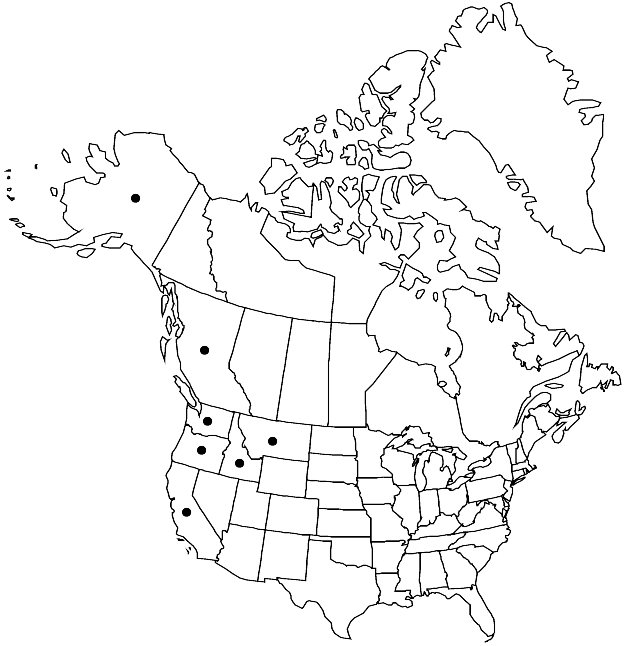Difference between revisions of "Homalothecium fulgescens"
Ber. Thätigk. St. Gallischen Naturwiss. Ges. 1876 – 1877: 309. 1878.
FNA>Volume Importer |
imported>Volume Importer |
||
| (2 intermediate revisions by 2 users not shown) | |||
| Line 70: | Line 70: | ||
|publication year=1878 | |publication year=1878 | ||
|special status=Endemic | |special status=Endemic | ||
| − | |source xml=https:// | + | |source xml=https://bitbucket.org/aafc-mbb/fna-data-curation/src/2e0870ddd59836b60bcf96646a41e87ea5a5943a/coarse_grained_fna_xml/V28/V28_690.xml |
|genus=Homalothecium | |genus=Homalothecium | ||
|species=Homalothecium fulgescens | |species=Homalothecium fulgescens | ||
Latest revision as of 21:37, 5 November 2020
Plants medium-sized to large, in loose tufts, light green when young, golden or brownish yellow with age. Stems to 15 cm, ± remotely pinnate, very unequal so branching appears not pinnate, branches to 20 mm, curved, sometimes flexuose. Stem leaves erect and somewhat spreading when dry, triangular-lanceolate, (1–)1.7–2.5(–3.3) × (0.2–)0.5–0.7(–0.8) mm; base short-rounded, narrowly decurrent; margins plane or often recurved at places, serrulate to subentire, teeth in alar region usually small, conspicuous, recurved; apex long-acuminate; costa to 70–90% leaf length, often vanishing in plications, terminal spine sometimes present; alar cells irregular, short-ovate to variously polygonal, usually mixed with short-elongate cells, 7–11 µm wide, region of 4–8 × 3–7 cells, ± distinctly delimited, usually not readily observed due to margins; laminal cells linear-flexuose, (35–)50–100 × 4–6 µm; basal cell shape irregular, short, region in 2 rows, indistinctly delimited from distal cells. Branch leaves erect and somewhat spreading when dry, slightly more spreading when moist, narrowly lanceolate, 1.5–2.2(–2.7) × 0.2–0.5(–0.6) mm; margins plane or recurved, serrulate or serrate proximally, entire or minutely serrulate distally; apex acuminate; costa to 70–90% leaf length, disappearing in acumen, terminal spine sometimes present; alar cells 6–10 µm wide, region small, distinctly delimited; laminal cells linear-flexuose, 25–85 × 4–6 µm; basal cells in 1 (or 2) rows; distal cells smooth. Sexual condition phyllodioicous or dioicous. Seta 0.7–1.5 cm, rough. Capsule erect, cylindric, sometimes slightly curved, 2–2.5 mm; annulus separating by fragments; operculum long-conic; peristome hygrocastique; exostome teeth with long transitional zone; endostome basal membrane high, segments as long as teeth, very narrow, cilia very short or occasionally 50–100% segment length. Spores dimorphic: 10–13 µm or 16–20 µm.
Habitat: Tree trunks, fallen logs, rock, moderate shade
Elevation: low to high elevations (0-2000 m)
Distribution

B.C., Alaska, Calif., Idaho, Mont., Oreg., Wash.
Discussion
The molecular phylogenetic analysis by S. Huttunen et al. (2008) does not confirm the suggestion by F. Renauld and J. Cardot (1893), H. Robinson (1962), and H. Hofmann (1998) that Homalothecium fulgescens is closely related to Eurasian H. lutescens (Hedwig) H. Robinson; therefore it is not considered a subspecies of the latter. The similarity in habit is apparently a case of convergent evolution. The large size and irregularly pinnate branching are important diagnostic characters of H. fulgescens. Leaves are densely arranged, but when dry they are somewhat spreading, not overlapping each other as is the case with most other species. The leaves also often exceed 2.2 mm, whereas in most other species in western North America they are usually shorter than 2 mm. There is clearly regularly pinnate branching in H. californicum and H. megaptilum, and occasionally only vaguely pinnate branching in H. aeneum; the latter species can be distinguished by more numerous and mostly regularly quadrate alar cells and more strongly curved capsules. Unclear outlines of the laminal cells and thick-walled alar cells with many ovate-elongate cells are also characteristic of H. fulgescens.
Selected References
None.